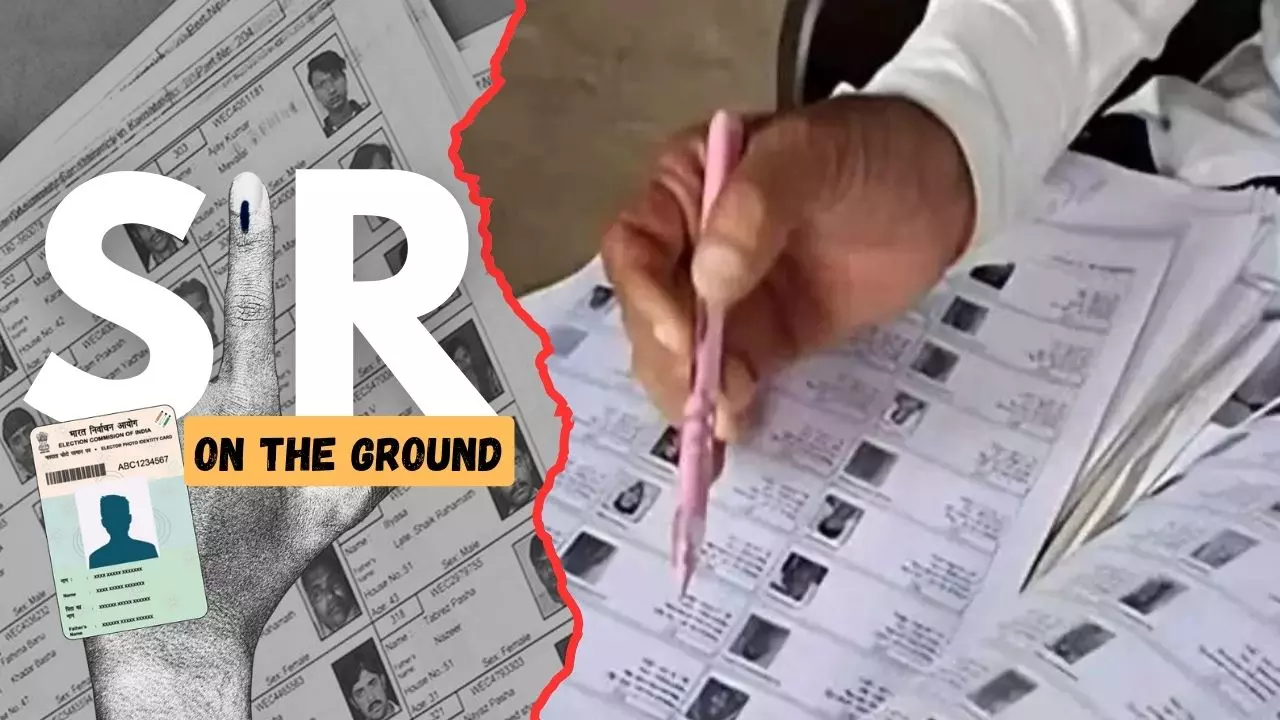
TN govt officials boycott SIR duties, announce ‘work stoppage protest’
Tamil Nadu Revenue Officials’ Association highlighted how District Collectors are pressuring Booth Level Officers to wrap up enumerations in just two to three days

Employees from seven major government workers' unions in Tamil Nadu, including the Revenue Officials’ Association, have announced a complete boycott of Special Intensive Revision (SIR) of electoral rolls duties starting Tuesday (November 18).
The move, described as a "work stoppage protest" rather than an outright confrontation with the state government, underscores crippling administrative bottlenecks that render the Election Commission's (EC) ambitious 30-day timeline unfeasible on the ground.
‘DCs pressuring BLOs’
State president of the Tamil Nadu Revenue Officials’ Association, MP Murugaiyan, told The Federal that the boycott stems from an inability to sustain the gruelling workload without support. "This protest is not against the government; it's to expose that we simply cannot perform these tasks under the current conditions," Murugaiyan said.
Also read: EC’s SIR drive ahead of 2026 TN polls triggers confusion, exclusion fears
He highlighted how District Collectors are pressuring Booth Level Officers (BLOs) to wrap up enumerations in just two to three days, far short of the EC's allotted 30-day window ending December 4.
BLOs, already juggling multiple roles — from noon meal schemes and Anganwadi supervision to revenue department tasks and teaching duties — are now thrust into door-to-door voter verifications without respite.
"Collectors hold three online meetings daily — morning, evening, and night — which eat up all our time," Murugaiyan added, noting that not a single rupee has been disbursed to workers despite round-the-clock demands. Promises of additional assistants remain unfulfilled, and there's no funding for essentials like photocopying forms, travel, or even meals.
Also read: SC tells EC to respond within 2 weeks to petitions against SIR in TN, Bengal
BLOs are instructed to scrutinise up to 200 applications daily, amplifying the strain. The association is also probing reports of political pressure on staff but emphasised that unresolved administrative hurdles are the primary trigger for the action.
Confusion at ground zero
The Federal spoke to several booth level incharges of political parties across Tamil Nadu, and they emphasised that forms require voters to reference historical data from the last SIR two decades ago (2002-2005), voters need old details like booth numbers and area codes to fill out forms, but these are hard to find or remember, especially in rural areas where online records show odd formats like "FYL" instead of the usual "TN-" before EPIC numbers. (Normally, EPIC numbers in Tamil Nadu start with "TN-" (for the state code), followed by more digits. But when people check the online versions of these outdated rolls, the EPIC numbers show up with a weird "FYL" prefix instead—like "FYL/XX/YYY" — which doesn't match what anyone expects. This mismatch forces users to hunt manually through blurry, scanned pages without easy search tools, wasting time and causing frustration).
BLOs get rushed training and are confused by unclear rules. Each BLO handles over 1,000 voters and isn't sure how to deal with small things like minor address changes or people who just moved in, so they're handing out forms at ration shops instead of going door-to-door, which leaves many people out. Even though the EC claims 92 per cent of forms have been covered, the real situation is chaotic, with daily wage workers and recent migrants often ignored. On top of that, ordinary people are confused and scared about losing their voting rights, making the whole SIR process a big source of worry.
In Chennai, scanned images of 2002-2005 rolls are grainy, non-searchable relics without universal EPIC linkages, forcing voters, who's shifted homes four times, to hunt futilely through faded pages amid post-2007 delimitation overhauls.
Newer voters (post-2011) or those without living relatives, reportedly submit incomplete forms riddled with gaps, while BLOs dispense only one form per household instead of the required two. Online portals crash under load, lacking basic EPIC search tools, and rural misconceptions, mistaking forms for voting slips further stall progress.
According to EC officials, as of November 12, 5.67 crore forms were distributed, but fears of mass deletions loom large, particularly among minorities recalling Bihar's exclusion precedents.
Response from CEO
In response, Tamil Nadu Chief Electoral Officer (CEO) Archana Patnaik issued a release bolstering the role of political parties in easing the burden. The EC has greenlit booth-level agents (BLAs) of recognised parties to submit up to 50 verified enumeration forms per day directly to BLOs, a measure aimed at accelerating the process ahead of the draft rolls' publication.
"BLOs are distributing forms to voters, but the active involvement of BLAs — who are key election stakeholders — is crucial for success," Patnaik stated.
She clarified that submissions must include a verified list with an undertaking confirming personal checks on form accuracy, underscoring the need for collaborative precision in this high-stakes revision covering over 6.4 crore electors.

